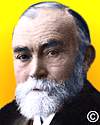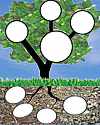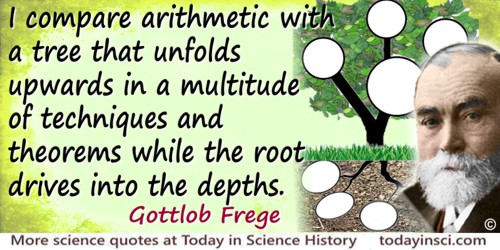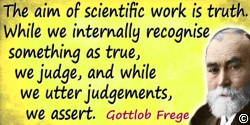 (source)
(source)
|
Gottlob Frege
(8 Nov 1848 - 26 Jul 1925)
German mathematician and logician.
|
Gottlob Frege
“I compare arithmetic with a tree”
Illustrated Quote - Medium (500 x 250 px)

More Gottlob Frege quotes on science >>
This is a translation from the original text published in 1893 by the German mathematician, Gottlob Frege, Grundgesetze der Arithmetik. A good context for this quote is given by Michael H. McCarthy:
“Frege’s philosophic career began with his intensive study of the foundations of arithmetic. In the course of his research, he developed a complex of logical beliefs and analytic methods strongly divergent from those of his predecessors and contemporaries. He was driven to philosophical reflection because of his discontent with the theoretical foundations of arithmetic. The mathematicians of his day were more intent on developing techniques and proliferating theorems than with disclosing the underlying conceptual structure of their science.
‘If I compare arithmetic with a tree that unfolds upwards into a multitude of techniques and theorems while its roots drive into the depths, then it seems to me that the impetus of the root, at least in Germany, is rather weak.’
When Frege spoke of the roots of arithmetic he referred to its primitive axioms, elementary concepts, and rules of inference, the logical ground on which axiomization might proceed.”
- Science Quotes by Gottlob Frege.
- 8 Nov - short biography, births, deaths and events on date of Frege's birth.
- Gottlob Frege - context of quote “I compare arithmetic with a tree” - Large image (800 x 400 px)
- Gottlob Frege - context of quote “The aim of scientific work is truth” - Medium image (500 x 250 px)
- Gottlob Frege - context of quote “The aim of scientific work is truth” - Large image (800 x 400 px)
- The Frege Reader, by Gottlob Frege and Michael Beaney (ed.). - book suggestion.
- Booklist for Gottlob Frege.






